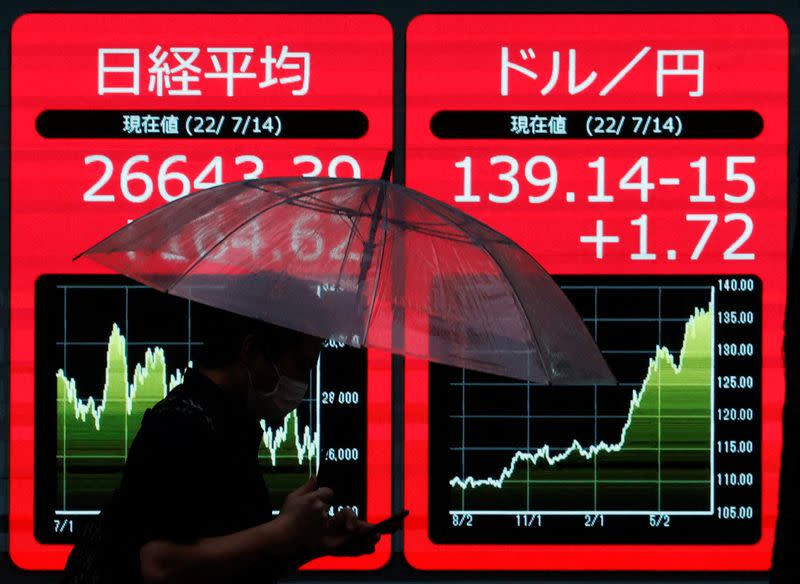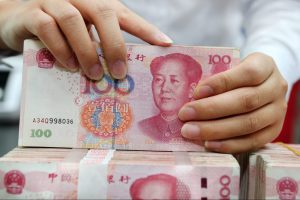Fears were growing of a global economic slowdown after bond market yields hit 16-year highs on Wednesday, amid a sell-off ignited by worries interest rates will remain high for some time to come.
The unrelenting sell-off in world government bond markets pushed US 30-year Treasury yields to 5% for the first time since 2007 and Germany’s 10-year borrowing costs to 3%.
A growing sense that interest rates in major economies will stay higher for longer to contain inflation, ever resilient US economic data and a sharp unwinding of traders’ positions for a bond rally have hit hard.
Also on AF: US Sanctions 8 Chinese Drug Companies for Fentanyl Trade
In the US Treasury market, considered the bedrock of the global financial system, 10-year yields have soared almost 30 basis points (bps) to 4.8% this week alone, and are up almost 100 bps this year, having jumped over 200 bps in 2022.
Thirty-year US yields on Wednesday touched the 5% psychological level for the first time since the global financial crisis, and Germany’s 10-year Bund yield hit 3%, a fresh milestone in a market where yields were negative in early 2022.
With the rout spreading, Australian and Canadian 10-year bond yields have surged over 50 bps each so far this week, and British 30-year government bond yields hit a fresh 25-year high above 5% on Wednesday.
“If the rapid rise continues it will hit risk appetite more clearly, you will see bigger drops in equity markets, bigger rises in spreads, and that should then stop the move as you will have safety flows coming back,” said Nordea chief markets strategist Jan von Gerich.
Government borrowing costs influence everything from mortgage rates for homeowners to loan rates for companies, with the speed of the bond rout sparking alarm across equity markets while driving the safe-haven dollar higher, in turn causing pain for other currencies such as Japan’s yen.
Bond strategists still expect yields to fall, and their price to rise, as the global economy weakens.
But they added that the momentum was for further price weakness, especially as investors who had held onto bets for a rally throw in the towel.
“Right now there is huge momentum behind the sell-off because the positioning in the market has been wrong,” said Juan Valenzuela, fixed income portfolio manager at asset manager Artemis.
“A lot of people bought into the idea that because the Federal Reserve was reaching the peak of rate hikes, it was time to buy government bonds, meaning that the majority of the market has been long.”
Third Year of Bond Losses
The latest selloff leaves global bond markets on track for a third straight year of losses. And in a sign of bond volatility picking up again, the closely-watched MOVE index has hit a four-month high.
“If we don’t look down, that 5% level could be with us quite quickly,” said Padhraic Garvey, regional head of research, Americas at ING, referring to 10-year Treasury yields.
Analysts said the move higher in inflation-adjusted, real yields was especially tough for corporate borrowers.
A fresh surge in borrowing costs is also a headache for central banks, as they weigh up the need to keep rates high to contain inflation against a deteriorating economic outlook.
“Over the longer run, this move itself has the power to sow the seeds of its own downfall,” said Richard McGuire, head of rates strategy at Rabobank, which expects a recession.
“Paradoxically, this [bond sell-off] only strengthens our confidence there because it will result in an inevitable tightening of financial conditions which will weigh on demand going forward.”
- Reuters with additional editing by Sean O’Meara
Read more:
China-Western Tensions Reshaping Global Business
China Limits Offshore Bond Purchases to Bolster the Yuan
China’s Shock Rate Cuts Ring Alarm Bells After Weak July Data
China’s $13tn Provincial Debt Crisis Threatens to Spill Over
BOJ Urged by IMF to Loosen Reins on Long-Term Yields























